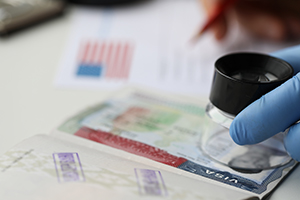Connecticut General Statutes § 53a-140 – Forgery in the 3rd Degree

Forgery in the 3rd degree is the least severe form of forgery under Connecticut law, but it is still a criminal offense that can leave you with a permanent record. A person commits this crime when, with intent to defraud, deceive, or injure, they make, complete, alter, or possess a forged written instrument that does not rise to the level of 1st or 2nd degree forgery.
Examples include creating or using a forged note, letter, receipt, or other non-official written document. Even though these items may seem minor compared to a deed or a passport, the law treats them as evidence of dishonesty and punishes them as a misdemeanor offense.
Elements of the Crime the State Must ProveTo obtain a conviction under § 53a-140, the prosecutor must prove beyond a reasonable doubt that the defendant:
- Acted with the intent to deceive, defraud, or injure, and
- Falsely made, completed, altered, issued, or possessed a written instrument,
- Where that written instrument does not fall into the categories reserved for higher forgery charges (public records, government IDs, contracts, commercial instruments, etc.).
Common examples of forgery in the 3rd degree include:
- Falsifying a receipt to return merchandise.
- Creating a fake letter to excuse an absence from work or school.
- Altering a store coupon or gift card.
- Producing a false reference letter.
These cases often begin when a business, school, or employer uncovers a discrepancy and refers the matter to police. While the documents may not carry the same weight as a will or a check, the State still has to prove that you acted with fraudulent intent. Simply making a mistake or submitting incorrect paperwork without knowledge it was false is not a crime.
Related Offenses- Connecticut General Statutes § 53a-138 – Forgery in the 1st Degree
- Connecticut General Statutes § 53a-139 – Forgery in the 2nd Degree
- Connecticut General Statutes § 53a-142 – Criminal Possession of a Forged Instrument
Defending against forgery in the 3rd degree often focuses on the absence of criminal intent. Some common defense strategies include:
- No intent to defraud – showing the action was careless or negligent, not intentional.
- Authenticity dispute – demonstrating that the document was not forged at all.
- Insufficient proof of knowledge – proving the defendant did not know the document was false.
- Constitutional challenges – suppressing evidence obtained without a valid warrant or probable cause.
Police sometimes issue a misdemeanor summons in forgery in the 3rd degree cases instead of taking a suspect into custody. This does not make the case less serious. A summons is still an arrest and creates a criminal record that will appear in background checks until the case is resolved.
PenaltiesForgery in the 3rd degree is a Class B misdemeanor in Connecticut. The penalties may include:
- Up to 6 months in jail
- A fine of up to $1,000
- A period of probation
- Long-term consequences to reputation, employment, and licensing due to the dishonesty associated with the offense
Many first-time offenders facing a forgery in the 3rd degree charge are eligible for Connecticut’s Accelerated Rehabilitation (AR) Program. This diversionary program allows defendants with little or no prior criminal history to have their case suspended while they complete a period of supervision.
If the program is successfully completed:
- The charge is dismissed
- The case is erased from the public record
- The defendant avoids a permanent conviction
AR is discretionary, meaning the judge decides whether to grant it. Your lawyer must argue persuasively that you deserve the opportunity for a second chance.
Frequently Asked Questions About Forgery in the 3rd Degree What Kinds of Documents Fall Under 3rd Degree Forgery?Things like receipts, notes, coupons, or letters that are not government records or major financial documents.
Is This a Felony?No. Forgery in the 3rd degree is a misdemeanor, but it still creates a criminal record.
Can I Be Charged for Altering a Receipt to Return Goods?Yes. That is a common example of forgery in the 3rd degree.
What if I Accidentally Submitted Incorrect Paperwork?Mistakes without intent to deceive are not forgery. Intent is a required element.
Will a Conviction Show Up in a Background Check?Yes. Employers and licensing boards will see a forgery conviction, which can raise concerns about honesty.
Can the AR Program Be Used for Forgery in the 3rd Degree?Yes. Many first-time offenders resolve their cases through the AR program.
Do Police Have to Prove I Actually Used the Forged Document?No. Possession of a forged instrument with intent to use it is enough.
What Happens if I Successfully Finish AR?Your case is dismissed, and the arrest record is erased.
Can a Forgery in the 3rd Degree Charge Affect Immigration?Yes. Crimes involving dishonesty or fraud can have immigration consequences even if they are misdemeanors.
Do I Need a Lawyer if the Charge Is “Only” a Misdemeanor?Absolutely. Even minor forgery charges can cause lasting damage if not handled properly.
Taking Control of Your CaseA forgery in the 3rd degree arrest may seem small, but it can have serious consequences for your future. An experienced defense attorney can fight to protect your rights, pursue dismissal through the AR program, and help you avoid a permanent criminal record.
Attorney Allan F. Friedman has defended clients throughout Connecticut against fraud and forgery allegations for over 30 years. We work aggressively to achieve the best results possible for every client.
Call (203) 357-5555 today for a free consultation, or contact us online anytime. We are available 24/7 to help you move forward with confidence.
 Allan F. Friedman Criminal Lawyer Home
Allan F. Friedman Criminal Lawyer Home











